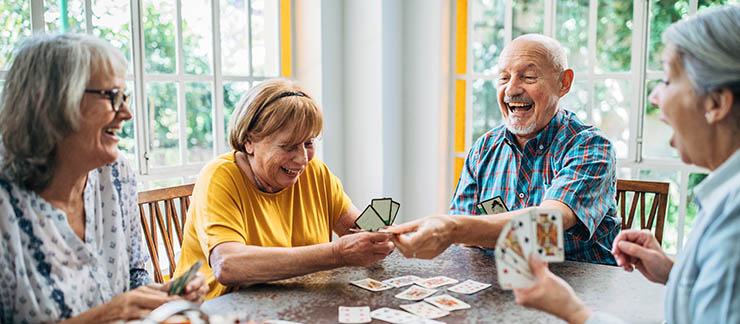
Social Connections Can Reduce the Risk of Isolation in Seniors
As seniors get older, their need for genuine human interaction becomes more profound, particularly when they experience adverse changes in their health and life circumstances. The death of a spouse, cognitive and physical problems, retirement, or a move to an assisted living facility can lead to isolation and feelings of grief, anxiety, loneliness, and depression.
While these feelings can be expected, seniors can experience a reduced quality of life when disheartened emotions last a long time.
A possible remedy is to ensure your loved one stays socially connected.
A strong support system comprised of family, friends, and community can help your senior fare better when faced with aging-related challenges. Many older adults also find having a professional in-home caregiver by their side is essential to staying socially active.
Risk Factors and Signs of Social Isolation in Seniors
Social isolation among seniors is a serious issue that deserves immediate attention. Identifying risk factors and subtle early signs can help your senior stay physically and emotionally connected and foster a healthier mindset.
Here are some events or circumstances that can put them at higher risk of experiencing social isolation:
- Cognitive changes due to dementia
- Death of a spouse or close friends
- Inability to drive due to cognitive concerns, vision problems, or physical health issues
- Living far away from family and friends
- Mobility problems that make it challenging to leave the home
- Moving to a new area where they don’t know many people
- Retiring from paid employment or volunteering
If your senior falls into one of these high-risk categories, monitor for signs of social isolation, including:
- Abnormal sleep habits, such as sleeping too much or sleeping too little
- Anxious or nervous behavior
- Boredom, lack of interest, and withdrawal from activities your senior used to enjoy
- Changes in eating habits, such overeating or eating too little
- Excessive messiness, clutter, or hoarding at home
- Increased confusion or disorientation
- Lack of concern about personal hygiene
Ideas for Increasing Social Connections in Older Adults
Visiting Angels can be instrumental in helping your senior remain active and build their confidence by assisting with planning, transportation, technology, and other necessary arrangements.
Here are some ideas of activities that can help your senior feel socially connected:
- Book clubs
If your senior likes to read (or listen to audiobooks), an in-person or virtual book discussion group can facilitate connection with others every month.
- Host a gathering
Hosting a simple gathering at home — even if it is a coffee club for one or two people — can provide an opportunity to socialize without the need to leave home.
- Online gaming
Online multiplayer games — such as chess, Scrabble, or Sudoku — can boost cognitive health and provide a fun way to socialize with far-away friends and family.
- Reunions
Reconnecting with friends and friends virtually or in person can encourage your senior to stay in touch with others — whether at a big annual event or during routine meetings.
- Volunteer
Through volunteering, your senior will meet other like-minded individuals who are passionate about a cause and enjoy contributing to their community. Community centers, schools, animal shelters, youth sports clubs, and other local organizations are good places to start if your loved one is looking to lend a helping hand.
- Worship
Attending religious services can help seniors socialize and boost their spiritual well-being. Many congregations offer programs specifically for older adults.
Help Your Senior Regain Their Confidence
Although your loved one might be reluctant, you can help them make new social connections. By welcoming new friends into their lives and working closely with an in-home caregiver, your senior can reap the benefits of companionship and companion care.
Learn more how Visiting Angels can provide consistent companionship and help your senior create strong social connections.
